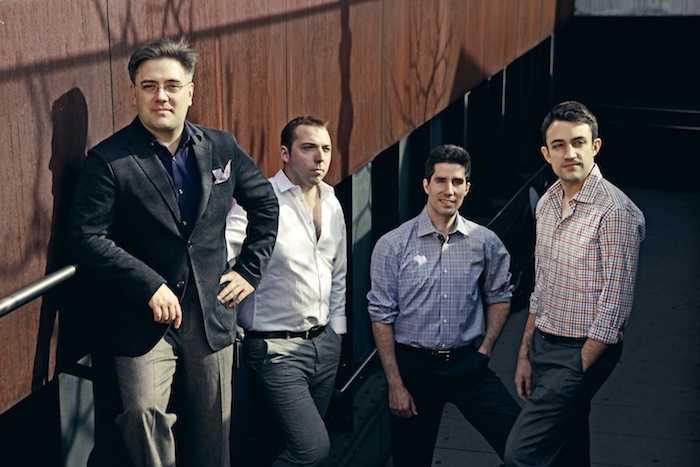Chamber Music Society opens summer series in high style

The Escher String Quartet performed at the Chamber Music Society of Lincoln Center concert Wednesday night. Photo: Sophie Zhai
The first heat wave of the year ushered in the opening night of the Chamber Music Society of Lincoln Center’s “Summer Evenings” series on Wednesday night. In its debut last summer, the series was a big draw, and the opening concert played to a full house in Alice Tully Hall.
This year’s curtain-raising program offered more substantial fare compared to the innocuous pleasures of 2015, and the performances stood out for a level of musical involvement one doesn’t always find during the summer season.
Responsibility goes primarily to the evening’s core musicians, the excellent Escher String Quartet. Augmented by brothers Roberto Diaz and Andrés Diaz on viola and cello, respectively, and horn player Kevin Rivard, the musicians played Mozart’s Horn Quintet, the Op. 44, No. 1 String Quartet from Felix Mendelssohn, and in the second half, Brahms’ Sextet No. 1 in B-flat Major. The pieces charted a superficial course from sunny to stormy, but that belies both Mozart’s depths and Brahms sweetness.
The K. 407 quintet—written for Mozart’s friend Leopold Joseph Leutgeb and using the unusual instrumentation of violin, cello, and two violas—is bright and full of lyrical charm with a conversational intimacy throughout. Escher violinist Adam Barnett-Hart, violist Pierre Lapointe, and cellist Brook Speltz were joined by Roberto Diaz and Rivard. A lovely piece to begin the evening, the performance sounded like the Platonic ideal of chamber music: a relaxed and convivial gathering among long-time friends.
The strings filled the accompaniment with space and light, and the dialogue between Rivard and Barnett-Hart—the horn slightly behind the beat and the violin pushing ahead—was like hearing two people enjoying finishing each other’s sentences. Rivard has a brilliant sound with a solid center, and played with agility and a fine sense of Mozartian phrasing.
The Escher members played the Mendelssohn quartet with such sympathy and verve that patrons could be heard humming the concluding phrase throughout intermission. Mendelssohn’s third work in the genre, it maintains a delicate equipoise between effervescence and sturm und drang, with the latter most prominently flowing to the surface then ebbing in the deceptively placid Menuetto. The Escher Quartet played with a beautiful sound, warm and buttery, with just enough grain, and excellent intonation. The piece is full of one elegant phrase after another, and the musicians played with a lightly held but palpable energy.
Coming early in his career Brahms’ First Sextet is a reminder that even though it took decades for the composer to meet the arbitrary obligation of writing a symphony, in the chamber realm he had been creating music with symphonic form and scope all along. The six voices give the piece a level of polyphony and rhythmic complexity beyond most string quartets, and the musicians brought out the sheer size of sound the composition makes possible.
The Brahms flowed along, carrying the players with it, and vice-versa. Despite a handful of murky bars in the first movement, and a few stolid opening phrases in the Andante, the performance was rich and fulfilling. Escher and the Diazes captured that special Brahms quality, a bittersweet beauty that carries a keen edge.
“Summer Evenings” continues 5 p.m. July 11, with music of Mozart, Dvořák, and Schumann. chambermusicsociety.org


